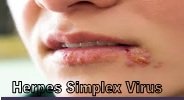
Herpes Simplex Virus: Causes and Preventive Measures
 Herpes simplex is generally a viral infection that primarily has an effect on the mouth or genital area. According to the information gained from the Centers for Disease Control in Atlanta, at least 45 million adults bear the genital strain of the disease and 65 percent of people are on the verge of having oral herpes. If you have had experienced a cold sore, you almost certainly have it. In this way the virus usually makes itself noticeable in our bodies. But there is always a way out to get rid of health problems almost of all kinds. There are certain strategies if followed carefully, it is possible to keep herpes in a state of hibernation, get better of the outbreaks and prevent your dear and near ones of your life from being turned into the object of your contagion.
Herpes simplex is generally a viral infection that primarily has an effect on the mouth or genital area. According to the information gained from the Centers for Disease Control in Atlanta, at least 45 million adults bear the genital strain of the disease and 65 percent of people are on the verge of having oral herpes. If you have had experienced a cold sore, you almost certainly have it. In this way the virus usually makes itself noticeable in our bodies. But there is always a way out to get rid of health problems almost of all kinds. There are certain strategies if followed carefully, it is possible to keep herpes in a state of hibernation, get better of the outbreaks and prevent your dear and near ones of your life from being turned into the object of your contagion.
Herpes Simplex Viruses: Two Strains
Before gaining some knowledge on how to prevent yourself from getting infected it is very important to get familiar with the two strains of HSVs.
Herpes Simplex Virus 1: It is generally allied with mouth, face and lips infections. It is the herpes simplex virus which is most common and numerous people may get infected with it in early days of their life. Sores (lesions) within the mouth, for instance, cold sores or the eye infection, particularly the cornea and conjunctiva are caused often by HSV type 1. It is handed on by get in touch with saliva that is infected. By parenthood, antibodies to HSV-1 will be seen in 30% to 90% of people. The probability of youth infection is found high amongst those having weak socioeconomic status.
Herpes Simplex Virus 2: It is something that is sexually transmitted. Genital sores or ulcers are the symptoms of it. However, symptoms are not found in a number of people with HSV-2. Nearly 30% of grown-ups in the U.S. come up with antibodies to combat HSV-2. It can result in burning and itching on your buttocks, upper thighs and genitals and hurting trips to the office urinal.
Both the strains are untreatable.
Herpes Simplex Virus- Studies
Numerous studies proved that a mother having HSV may pass on the disease to her baby at the time of vaginal delivery, particularly when the mother is carrying an infection which is active during delivery. Nevertheless, 60 – 80% of HSV contagions obtained by newborns take place in women having no symptoms of HSV disease. It is possible for the HSV infection to get transmitted even when there are no HSV symptoms or perceptible sores. Two-thirds of people experiencing genital HSV infection have reappearances of their signs and one-third of the people have three or more outbreaks every year.
How to Prevent an HSV Outbreak
Preventing HSV infection is little bit difficult because the virus can be spread to people by the people having this kind of infection even when they don’t have any signs of an active outbreak. But there are few things that can be followed in order to prevent an outbreak.
Avoiding sexual contact by people having genital herpes when they are experiencing active lesions, secure sex behaviors that include the use of condoms and so on may also decrease the risk of HSV infection.
A study printed in the American Journal of Sports Medicine revealed that outbreaks of oral herpes are often found among skiers when they get exposed to the sun, particularly to ultraviolet-B rays.
Avoid stress as health experts are of the opinion that any stressful circumstance whether it is love or family stress helps making your immune system weak and provides herpes an opening.
People experiencing active HSV lesions should also avoid getting in contact with newborns, people with suppressed immune systems, children with eczema because these groups are at higher and great risk for more detrimental disease.
A cesarean delivery (C-section) is highly suggested for pregnant women having an active HSV infection in order to lower the risk of spreading the infection to newborns.

Leave a Reply